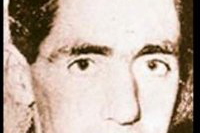Death of Gerry Conlon highlights shameful failures in British justice

Gerry Conlon
The funeral of Gerry Conlon, who was wrongly convicted of being an IRA bomber and spent 15 years in prison before he was cleared, took place on 28 June at St Peter's Cathedral in Belfast. During the service, Mr Colon's lawyer Gareth Peirce, who campaigned for his freedom, said how he was punished year after year in solitary confinement for protesting his innocence.
"His father who came to help, was arrested, convicted and died in prison . His aunt, his uncle his cousins, their neighbours were all imprisoned. All on false evidence" she said.
"When he was released, it wasn't as he had hoped." Those 15 years had done irrevocable damage, she said.
Fr Keiran Dallat, who gave the homily said Gerry's life had been full of painful memories and he carried a burden of guilt over the death of his father in prison.
"He took time and went to other places and tackled other injustices. He reminded us that people get it wrong - institutions, authorities." Fr Dallat commented that Gerry only had three weeks from his diagnosis with lung cancer to his death: "he had done an awful lots of suffering in his early life and didn't need to suffer again."
Journalist Paul Donovan comments.
The death of Gerry Conlon at the age of 60 marks a sad day for the British justice system.
Conlon was one of four people unjustly convicted for the Guildford pub bombings in 1974, which killed five people and injured 65.
In the febrile atmosphere of the time, as the IRA bombing campaign extended to England, the police were on alert for any possible atrocity. Anti-Irish Catholic hostility was at its height.
When the Guildford and later Birmingham pub bombings happened, the police were quick to move, grabbing as it turned out the nearest Irish person.
Conlon was one of those unfortunately convicted. It took 15 years for the four individuals known as the Guildford Four to attain justice.
Many people helped over the years in the justice campaign, not least solicitor Gareth Peirce, Cardinal Hume, the late Sister Sarah Clarke who supported the families.
The families themselves played huge roles in establishing the innocence of their loved ones. Gerry's father Giuseppe came to
London to fight for his son's innocence, only to get caught up in the whole terrible business himself. He was arrested together with members of the Maguire family and convicted of terrorist offences.
Giuseppe played by Pete Poselthwaite in the film about the Guildford Four, In the Name of the Father, was to die in prison in 1980. The Maguires and Guiseppe (posthumously) were also later cleared of their convictions.
Gerry Conlon's mother and sisters were to continue to steadfastly support him throughout the long years in prison. Sister Sarah Clarke played a major role in supporting the family and men over this period.
She helped first raise the case with Cardinal Hume, who visited Gerry and Giuseppe Conlon in prison. Later Cardinal Hume helped get a delegation including former home secretaries Merlyn Rees, Roy Jenkins and Lords Devlin and Scarman to meet with the Home Secretary of the time to try to get the case reopened.
At the time of Gerry's untimely death, new reports included the clips from that triumphant day back in 1989 when the Guildford Four were finally cleared of murder. The iconic picture of Gerry together with family, arm raised aloft in defiance. What few would realise is that whilst he had won a triumph over the justice system this was just the beginning of another struggle.
The general public believe that once an individual has been cleared of such crimes, they get compensation and life resumes. The reality could not be further from the truth. Innocent prisoners are actually treated worse than those who have actually done the crimes. No preparation for release, accomodation arranged or resettlement courses. Most are just kicked onto the street with a bag for their belongings and a payment of £40 or so to be getting on with. It is as though the justice system is having its final vengeance for having been found at fault for incarcerating innocent people in the first place.
Yet most of these victims of miscarriages of justice need a lot of support. Gerry Conlon had two breakdowns, suffered with drug and alcohol addiction and attempted suicide. He received some treatment for Post Traumatic Stress Disorder.
Nor was Gerry's situation isolated. Billy Power of the Birmingham Six told of his difficulties in resettling into life outside. A door with a handle that can be turned and opened from the inside. The busy streets and way life had changed over the 16 years away. Billy told how he was used to battling the Home Office and justice system but found it much more difficult to deal with rows in the family. The Birmingham Six were found to have psychological problems.
Few of the high profile miscarriage of justice victims ever work again. Some put a lot of effort into working for the justice of others. Gerry Conlon became involved with several cases over the years and played an important role in the work of the excellent Miscarriage of Justice Organisation (MOJO).
Gerry also notably spoke out over the miscarriages of justice of the present day, with people being put under control orders and detained for years on end without ever being brought before a properly constituted court of law.
Paddy Hill of the Birmingham Six is another who has played an active role working for justice. He has been involved in several campaigns and was a founder member of MOJO.
Billy Power of the Birmingham Six campaigned for fellow Irish prisoner Frank Johnson , who was finally cleared of murder in 2002 afteer serving 26 years.
Frank was another turned onto the street with £40. He lived his first few months of freedom at Billy's house. He died in 2008.
The death of Gerry Conlon should be a time for society to reflect on a justice system that still convicts innocent people. It should also be a time to examine just how these damaged individuals are treated when released. They require support and help, not simply to be chucked on the criminal justice scrap heap.
Paul Donovan is a London-based journalist and blogger. See: www.paulfdonovan.blogspot.com
















